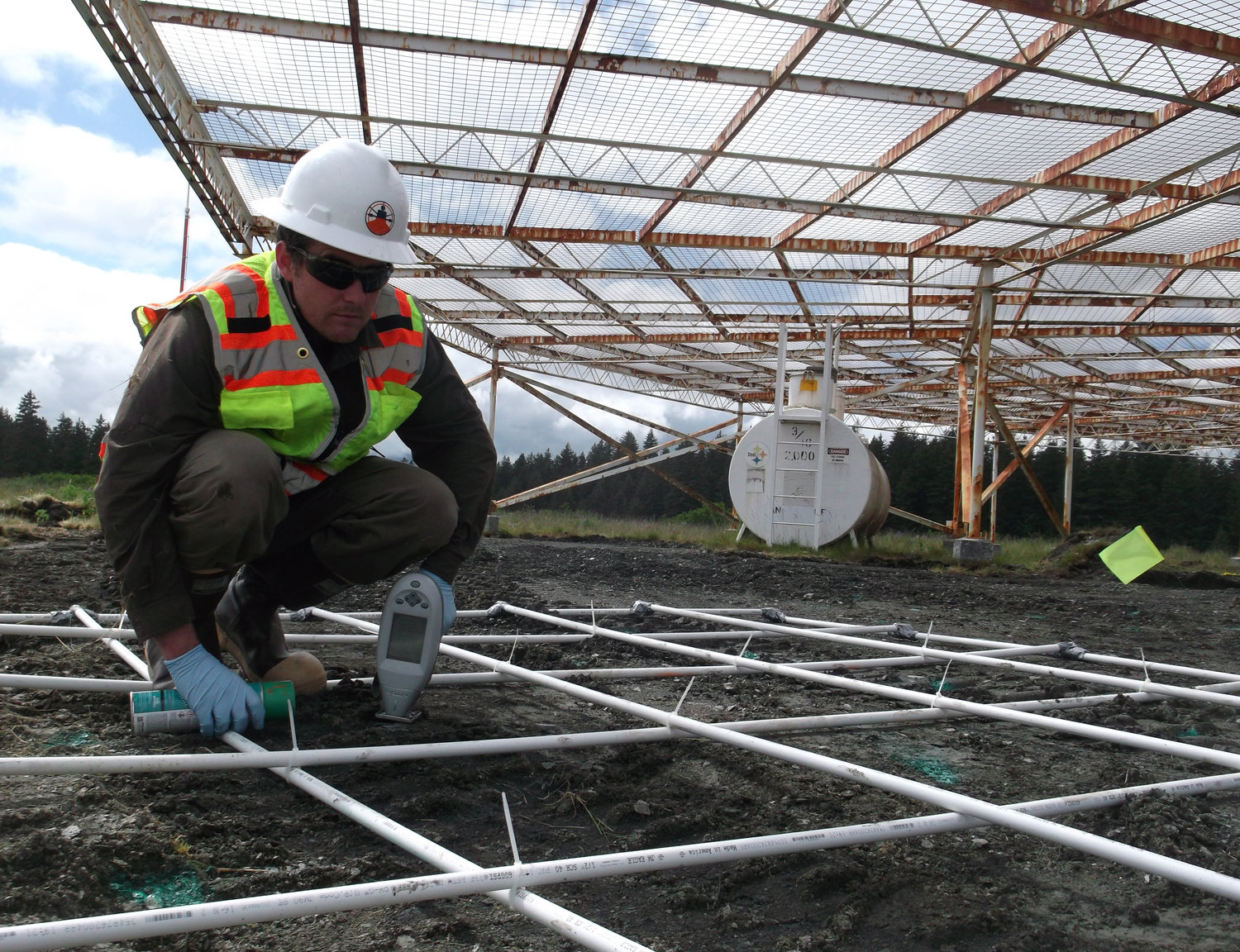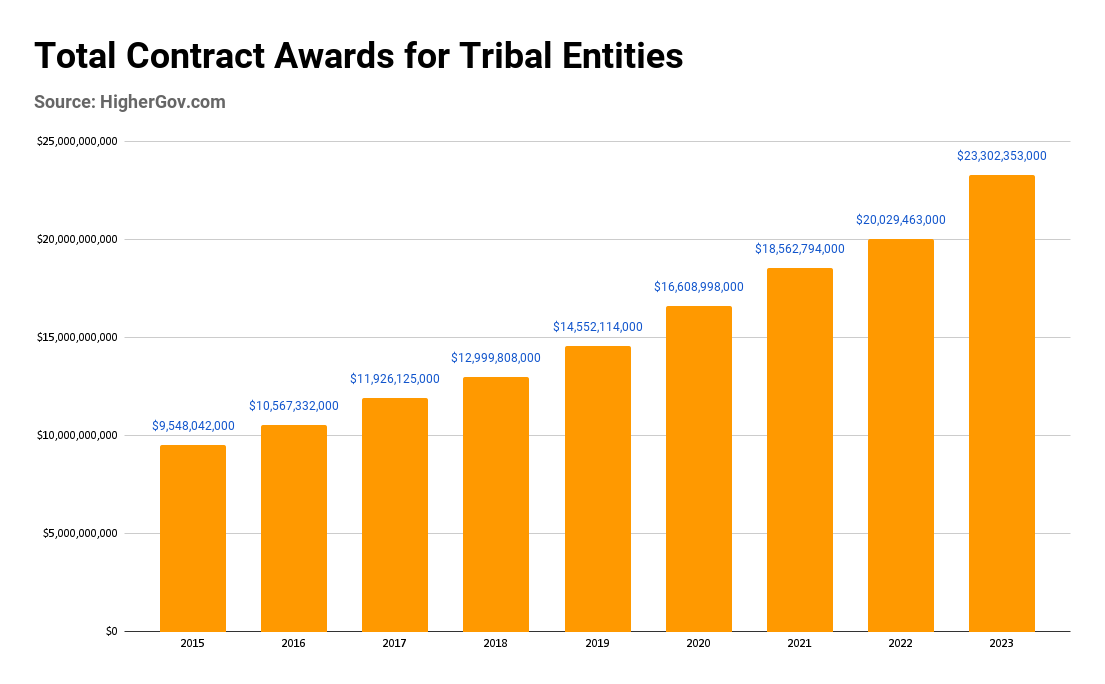
- Details
- By Brian Edwards
- Native Contracting
The U.S. government, the world’s largest buyer of goods and services, increased its purchasing to record levels last year and that was very good news for tribal entities in the federal contracting sector.
The surge in federal buying during fiscal 2023 helped push contract awards to tribal entities to record heights last year. Federal awards to tribal enterprises increased to a record $23.3 billion in fiscal 2023, a 16.3% increase over fiscal 2022, according to exclusive data provided to Tribal Business News by HigherGov, a market intelligence firm that tracks federal contracting.
The increase of $3.3 billion in awards to tribal entities last year was due primarily to double-digit growth in federal contracts from the U.S. Department of Defense (DoD) versus the prior fiscal year.
 Contract awards for tribal entities have grown for eight straight years, according to market intelligence firm HigherGov data.
Contract awards for tribal entities have grown for eight straight years, according to market intelligence firm HigherGov data.
The 2023 awards mark the eighth consecutive year of growth in federal contracting awards to tribal entities that self-identify as a tribal government, tribally-owned firm, Indian tribe, Indian economic enterprise, Native Hawaiian Organization-owned firm (NHO) or Alaska Native Corporation-owned (ANC) firm, per HigherGov.
“Native-owned businesses have seen some of the strongest and most consistent growth in the federal contracting market over the past 10 years, growing at an average annual rate of 10.3% versus the market average of 6.1%. We anticipate this outperformance will continue in 2024,” HigherGov Founder Justin Siken told Tribal Business News.
That growth helped tribal entities earn a bigger portion of the federal contracting pie last year, with Native entities earning 3.05% of the total contract dollars awarded in fiscal 2023. That compares with about 2.5% of total contract dollars awarded in 2021, according to an analysis by the Center for Indian Country Development (CICD) at the Federal Reserve Bank of Minneapolis.
In a 2022 report, CICD emphasized that federal contracting has been an important — and growing — source of non-gaming revenue over the last four decades for Native entities owned by federally recognized tribes and ANCs as well as NHOs.
“For many Native communities, federal contracting has provided meaningful job opportunities where they didn’t exist before, enhanced the professional and technical skill sets of Native talent, and generated essential revenues to provide robust public services in some of the most underserved communities in the country,” Casey Lozar (Salish-Kootenai), director of CICD, told Tribal Business News.
Yet, while federal contracting has been an essential tool for Native communities to practice economic self-determination, only a relatively small number of Native entities across the country have participated in the sector, Lozar said. “Continuing to find meaningful pathways into the industry will assist disadvantaged Native communities to improve their long-term community and economic well-being,” he added.
 Picture (from left): Justin Siken, Casey Lozar
Picture (from left): Justin Siken, Casey Lozar
Tribal entities were not the only ones to benefit in fiscal 2023, as overall federal contract awards grew for a second consecutive year, following a contraction in 2021.
Total federal government contract awards rose 9.5% to a record $765 billion in fiscal 2023, driven largely by growth in Department of Defense (DoD) procurement programs, according to a special report HigherGov analysis.
In fiscal 2023, the DoD accounted for nearly 61% of total contract awards with growth driven by the war in Ukraine and spending obligations for the F-35 combat aircraft program, the report notes. Software and hardware technology contract awards grew for the ninth straight year, reaching over $80 billion in 2023, while construction awards rebounded strongly in 2023.
Contract awards related to COVID-19 response fell sharply, declining 82% versus the prior year as spending on vaccine production, medical equipment and related supplies dropped.
Despite the record increase in 2023, growth in federal contracting awards may be limited in 2024 due to budget uncertainties and other factors, the HigherGov report notes.
“Despite the strong 2023 for contractors, the outlook for 2024 is far more uncertain,” the HigherGov report notes. “2023 awards benefited from increases not likely to be repeated every year, such as the exercise of options on the F-35 (the largest defense program ever) and a surge in supply of weapons to Ukraine.
“While we do not expect the 2024 election to have much direct impact on FY 2024, continued uncertainty regarding the FY 2024 budget may create downside for contractors, and the final details of the budget agreement recently reached by congressional leaders will greatly impact the areas most affected by the tighter federal budget. Regardless of the ultimate details, it is clear that contract awards will be under greater pressure in 2024 and 2025.”
